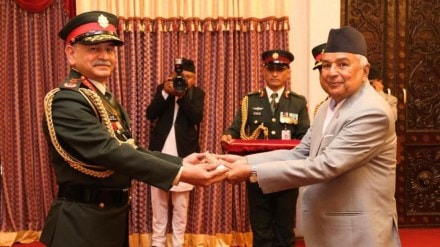In a significant display of the long-standing military camaraderie between India and Nepal, Indian Army Chief General Upendra Dwivedi was conferred the rank of Honorary General of the Nepal Army during a formal ceremony in Kathmandu on Thursday. The ceremony was presided over by Nepal’s President Ramchandra Paudel, underscoring the deep-rooted military traditions shared between the two nations.
This honour is not an isolated event but rather a part of a time-honoured tradition between India and Nepal that dates back to the 1950s. Every three years, the Chief of the Indian Army is conferred with the title of Honorary General of the Nepal Army, and vice versa. This reciprocal gesture reflects the strong military ties and mutual respect between the two countries. It symbolizes a shared commitment to regional security and cooperation, going beyond formal diplomatic relations to emphasize the unity and strategic partnership between their armed forces.
The Army Chief’s visit to Nepal comes at a time when relations between the two countries have been strained, particularly over issues such as the Agnipath recruitment scheme. Nepal has recently banned the recruitment of its Gorkha youth as Agniveers in the Indian Army, significantly impacting the enrollment of Nepali soldiers in the Indian Army’s Gorkha Regiment. This ban has sparked tensions, especially as the Gorkha community has historically played a crucial role in the Indian Army.
However, despite these challenges, the tradition of honorary generalship continues to highlight the enduring military cooperation between India and Nepal. Over 80,000 former Indian Army soldiers currently reside in Nepal, a testament to the historical ties and the crucial role the Gorkha soldiers have played in both nations’ defence forces. This tradition of mutual recognition underscores the strong bonds shared by the two countries’ armed forces, built on a foundation of trust, solidarity, and shared strategic interests.
His visit is also expected to provide a platform for high-level discussions on joint military exercises, training, and regional security concerns. During his stay, General Dwivedi is scheduled to meet with his Nepali counterpart, General Ashok Raj Sigdel, to explore opportunities for further collaboration. This is especially relevant as 300 Nepali Army officers and soldiers are currently undergoing training in India, further cementing the defence ties between the two nations.
In addition to the military cooperation, General Dwivedi’s visit serves as a positive counterpoint to the diplomatic challenges facing India and Nepal. Nepal’s choice of China as the destination for its Prime Minister’s first official visit this December further complicates the bilateral relationship. Nepal’s decision to select a Chinese company for printing its new currency notes, which include a controversial map depicting disputed territories like Kalapani, Lipulekh, and Limpiyadhura, has also contributed to the strain between the two neighbours.
Nevertheless, the symbolic act of conferring the Honorary General rank during General Dwivedi’s visit is an important step toward mending ties. The gesture highlights the resilience of the military relationship between India and Nepal, even in the face of political disagreements. Both countries recognize the importance of regional stability and peace, and the exchange of honorary ranks serves as a powerful reminder of their shared commitment to these ideals.
Looking ahead, the Indo-Nepal military relationship will be further strengthened in December with the 18th edition of the Suryakiran Exercise, a joint military drill set to take place in Nepal. This exercise will provide a valuable opportunity for both armies to enhance their cooperation in areas such as disaster response and counterterrorism, while also reinforcing their commitment to mutual security and peace in the region.
